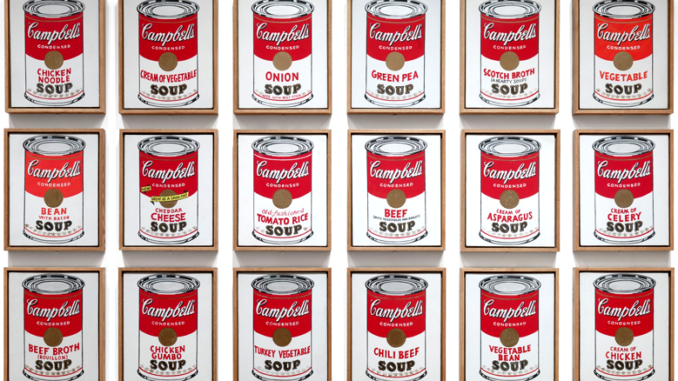
Campbell’s Soup is as American as baseball and apple pie. Its products have been on grocery store shelves, in one form or other, since 1869 when it’s founder Joseph A. Campbell, a fruit merchant, partnered with Abraham Anderson, who manufactured iceboxes, began producing and manufacturing canned items such as tomatoes and jellies, minced meats and condiments, and soups.
It wouldn’t be until 1897, after some reorganization after Anderson left the partnership, Campbell ventured into the condensed versions of his soups when his GM’s nephew John T. Dorrance, armed with chemistry degrees from MIT and Germany’s Gottingen University, earning $7.50 a week, developed the condensing method viable for commercial production by reducing the amount of water by half.
And from there the company took off to become one of the biggest food companies in the world. Its products can be found in 120 different countries and they’ve expanded their brand to include Bolthouse Farms, Pepperidge Farm’s, Kelsen Group, Pace, Swanson, Prego, and SpaghettiOs.
As the trends started turning to health food they moved with the times with brands like StockPot, Garden Fresh Gourmet, Plum Organics, Pacific Foods, and even recently developing through their own R&D “three new lines of soup – Well Yes, Garden Fresh Gourmet and Souplicity soups” as recently as 2017 and showed a $7.96 billion dollar profit the year before, the Washington Post reported, as Campbell’s ‘was trying to cook up a recipe for the company’s future.
So why would Campbell’s today now find itself under pressure to sell with a profit return in the multiple billion-dollar figure?
The Washington Post goes on to say that while Campbell’s soups are known as those “cold-weather staples that debuted more than a century ago … and helped make shelf-stable goods a fixture in the American pantry” it is because of those changing trends into more healthy eating habits by consumers that it is “against this backdrop that Campbell’s U.S. soup business has entered a years-long rough patch, highlighted by sales that declined or remained flat for the past eight quarters.”
So in May of this year after Campbell’s announced the departure of its CEO Denise Morrison after seven years at their helm, along with profit warnings and third-quarter losses, enters hedge-fund manager and “activist investor,” The Wall Street Journal reported in July.
Activist investor Third Point LLC has built a stake of more than $300 million in Campbell Soup Co. CPB -2.20% , according to a person familiar with the matter, adding to pressure on the soup maker as it seeks to turn around its business and reverse a sharp stock-price decline.
The Wall Street Journal 7/31/18
At this point no one knew what the plans were as Campbell’s heads into their FY fourth quarter with the boards’ own plans to evaluate their portfolio, or how much Loeb’s stake represented in the company, but as New York magazine reported, Loeb’s “preferred strategy” includes buying into ‘troubled companies, replace inefficient management, and return companies to profitability.”
Which leads us to Friday’s report from MSN Money announcing “Third Point’s Dan Loeb will call for the sale of Campbell’s Soup.”
According to securities filings Third Point’s stake amounted to 5.65% and that Loeb revealed he now had a surprise “ally in George Strawbridge, the 80 year-old grandson of company founder Joseph Campbell, who disclosed a 2.8% stake of his own,” Axios reported, pointing out that this could be a set up for an “inter-family rift” since there are other family descendants also hold not only stakes, but sit on the board as well.
And while all the family and board members may not agree to sell, MSN Money goes on to say, they are taking a hard look at things like spinning off some of their brands as well as looking into working with Centerview Partners who is an investment bank, but that “whether the family can be pressured to sell is open for question.”
Why This Matters
Traditions change with the ebb and flow of trends. Some are harder to let go of more than others, some fade away without even a notice, and for some it can mean a loss of a way of life or even control of those ever-changing things. Whatever Campbell’s Soup Co ultimately ends up doing, whether they sell off everything, only some things, whether Daniel Loeb manages to go in and work whatever magic he’s famous for working and returns them to a mainstay into the future for a little longer, nothing can change our memories of what was. And life goes on, as it’s meant to be.
